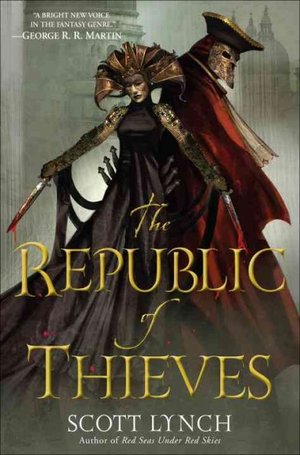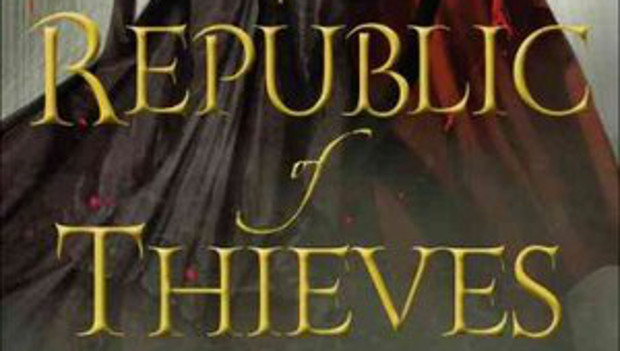Holy Crap It’s Republic of Thieves!
“FANTASY EVENT OF THE YEAR” is ad-copy noise, so blaring and ubiquitous as to be totally meaningless. Whose year are we even talking about? But when pictures of the ARC for Republic of Thieves hit the Twitterverse, with said ad-copy plastered garishly across the front, the story checked out. In the sphere of fantasy literature, my year, your year, and definitely Scott Lynch’s year, can be fairly said to orbit around the release of this book.
If you’re not familiar, then stop reading this moderately spoilery review (as much as it pains me to say so), open a new browser tab, and get yourself a copy of The Lies of Locke Lamora. We’ll be here when you get back. Reviewing Lies (or its sequel Red Seas Under Red Skies) would be redundant at this stage, so brief summary: fantasy proto-Renaissance Italy, con artists, hijinks, romance, brotherhood, treachery, black magic, revenge, rinse and repeat. It was awesome, it set the fantasy world on fire, and now with Republic the series (the Gentleman Bastard Cycle, which pretty much sums it up) continues.
 For diverse reasons, it’s a triumph that Republic of Thieves even exists, but the temptation to just uncritically squee and hand out ten gold stars is balanced by all the hype the long wait has garnered it. Nevertheless, disclaimer: I came into this desperately wanting this book to be good, nay, great. Fortunately, well, it is.
For diverse reasons, it’s a triumph that Republic of Thieves even exists, but the temptation to just uncritically squee and hand out ten gold stars is balanced by all the hype the long wait has garnered it. Nevertheless, disclaimer: I came into this desperately wanting this book to be good, nay, great. Fortunately, well, it is.
Much like Lies, Republic interleaves a present-day narrative of the eponymous Locke and his partner Jean Tannen with the story of their bizarre upbringing and training as thieves. The former picks up pretty close to where we left them (in a boat, with two cases of poisoning and one dose of antidote, with predictably unpleasant results); the latter starts with a few one-off scenes and then settles into a story of the Gentlemen Bastards in their troubled teenage years, engaging in the most diabolical and morally bankrupt scheme of their lives up to that point – becoming actors.
I think the flashback narrative may actually be a stronger story than the current adventures of Locke and Jean, which, after the whole “deadly poison” thing is dealt with (spoiler, like it wasn’t obvious), leads them to an engagement as skullduggerous election-riggers for a cabal of wizards. It’s a good and entertaining arc, but it sometimes reads like a necessary framework to the real story of Republic, which is the third point of Locke and Jean’s triangle – but more on that later. The flashback works better, with a little more focus and a clever commedia dell’arte vibe to it, and the ever-welcome presence of Calo and Galdo Sanza, twin walking disasters.
Mr. Lynch’s greatest gift as a writer, the thing that raised Lies heads & shoulders above other 00s fantasy debuts, is dialogue, and that hasn’t changed. Locke & Jean and their supporting cast are wry and snappy without being precious or exaggerated; maybe it’s the electioneering aspect of the plot but I got a whiff of Aaron Sorkin (good Aaron Sorkin) from Republic’s banter. The flashback handles the circumlocutions and pretensions of teenagers who are twice as clever as they ought to be but half as clever as they think they are, and keeps it funny without descending into farce. Even when the book gets bogged down in plotting, it’s at least fun to watch the characters talk their way out of it.
And when Republic needs to get heavy, it does. There’s a couple revelations (and a truly startling, and moderately horrifying ending) that duck the faint air of sly, smirking adventure that animates so much of the Gentleman Bastard cycle thus far. The big discoveries (related to the nature of Locke & Jean’s sorcerous employers) are, you know, big, but they’re almost a sideshow to the fast-paced scheming and reversals of fortune that animate the book. Middle-trilogy setup, in other words (this is the third of a planned seven novels), with the occasional awkward hiccup that that entails. Mr. Lynch’s exposition is readable, crafty, and surprising, but it’s still unavoidably exposition.
And therein lies the core challenge of this book, because really, Republic of Thieves isn’t about the plot. It’s about the characters, or specifically, the character, the much-referenced, never-seen, Sabetha Belacoros. Sabetha, sole woman of the Gentlemen Bastards, love of Locke Lamora’s life (despite both their common sense), and criminal so elusive that her own former partners couldn’t track her down in the first two books, was something of a self-produced hurdle for Mr. Lynch to jump. After two books building her up, and another one essentially dedicated to introducing her (both in the present day and in the flashback), she had to be great.
Well, she is. Republic was always going to live or die with Sabetha, and she fairly jumps off the page. She put me in mind of the eminently frustrating Name of the Wind, which had (among other issues) one of the most frustrating romantic leads of any fantasy I can remember; Sabetha struck me as the cagey, self-possessed woman that Patrick Rothfuss was trying to write in that book. She’s not just “The one chick in the Gentlemen Bastards,” but a cynical, charming, ambitious person whose potential status as Token Girl is referenced, subverted, and challenged without becoming all-consuming. Sabetha’s as deeply flawed a character as Locke – she’s occasionally unreasonable, covers her moments of weakness with borderline murderous pugnacity, and is competitive to the point of obsession – and is all the stronger for it.
Letting the book rest so much on this one character was a gamble, but maybe a necessary one depending on Mr. Lynch’s plans for the next four books, and either way it paid off. It’s something of a meta-writing trick actually; when Sabetha is around, the words just jump off the page at the reader, and everything is livelier and brighter, even when people are getting stabbed and poisoned. In other words, we get to see what Locke sees. And it’s a hell of a stretch not to like what we see.
Republic of Thieves isn’t perfect, but it’s strongest where it needs to be strong, and weakest where it can afford to be weak. And as with the stellar Lies of Locke Lamora, it manages to tell a self-contained story (two, really!) while still serving its purpose in the pantheon of Gentleman Bastard books. Scott Lynch has come back to us, if not empowered by his absence from our shelves, certainly not weakened by it, and done just what his characters are always trying to do – tell us a crazy story, take our money, and make us thank him for it. Read it now, read it again, and then join me in waiting eagerly for the next one.






